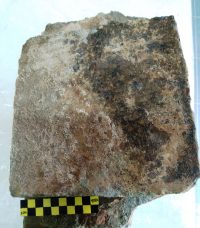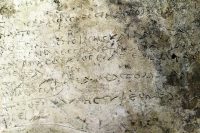 Archaeologists have discovered a clay tablet inscribed with verses from The Odyssey in Olympia, Greece. Found next to the Temple of Zeus with Roman-era artifacts, the slab is engraved with 13 verses from Odysseus’ speech to Eumaeus. Preliminary analysis suggests it dates to the Roman era, probably before the 3rd century.
Archaeologists have discovered a clay tablet inscribed with verses from The Odyssey in Olympia, Greece. Found next to the Temple of Zeus with Roman-era artifacts, the slab is engraved with 13 verses from Odysseus’ speech to Eumaeus. Preliminary analysis suggests it dates to the Roman era, probably before the 3rd century.
Olympia, the venue of the ancient Olympic Games, was a religious center from long before Homer was a twinkle in his mamma’s eye. There is archaeological evidence of burned offerings made at the site in the 4th millennium B.C. The first known temple was constructed in the early 7th century B.C. and was dedicated to Hera. Her husband overtook her in the mid-5th century B.C. when the Sanctuary of Zeus was built on a grander scale than any of the previous religious structures. The monumental gold and ivory statue of Zeus sculpted by Phidias (who had a workshop at Olympia) was one of the Seven Wonders of the Ancient World.
Olympia remained a cultural and religious beacon in the classical world even after it became part of the Roman Empire. Olympic games were still held and the faithful still flocked to the sanctuaries. It suffered from earthquakes and barbarian invasions in the 3rd century, but it wasn’t until the 5th century when it really came tumbling down. Literally. Eastern Roman Emperor Theodosius II ordered the Temple of Zeus destroyed in 426 A.D. and a series of earthquakes in the 6th century finished the job.
 The tablet was discovered during geoarchaeological survey of the site as part of the Multidimensional Space of Olympia program, a project which explores the relationships between the sanctuary and surrounding areas. During three years of fieldwork (2015-2017), a multidisciplinary team of researchers did an intensive grid survey of ancient Olympia, its immediate surroundings and the nearby villages of Epitalio and Salmone. They made several important discoveries in the process — Mycenaean chamber graves, Bronze Age terracing, the remains of an ancient polygonal wall and one very special clay tablet.
The tablet was discovered during geoarchaeological survey of the site as part of the Multidimensional Space of Olympia program, a project which explores the relationships between the sanctuary and surrounding areas. During three years of fieldwork (2015-2017), a multidisciplinary team of researchers did an intensive grid survey of ancient Olympia, its immediate surroundings and the nearby villages of Epitalio and Salmone. They made several important discoveries in the process — Mycenaean chamber graves, Bronze Age terracing, the remains of an ancient polygonal wall and one very special clay tablet.
The tablet’s likely age places it at the end of Olympia’s long history of Panhellenic prominence. It’s of enormous significance because even at so late a date it is likely the oldest written extract of the Homeric epic known to survive. It is now undergoing conservation and detailed epigraphic study which will confirm or deny the preliminary dating and hopefully narrow it down further.